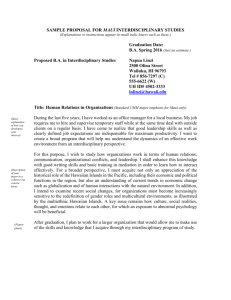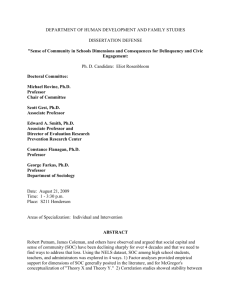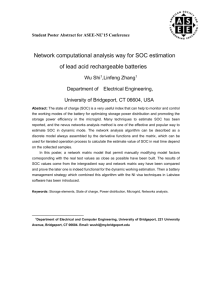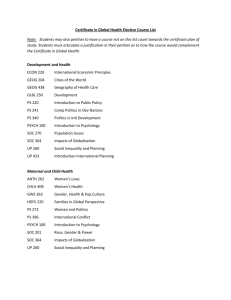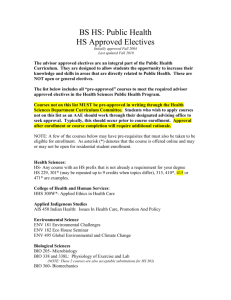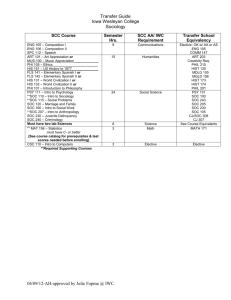Center for Communication, Culture, and Change
advertisement
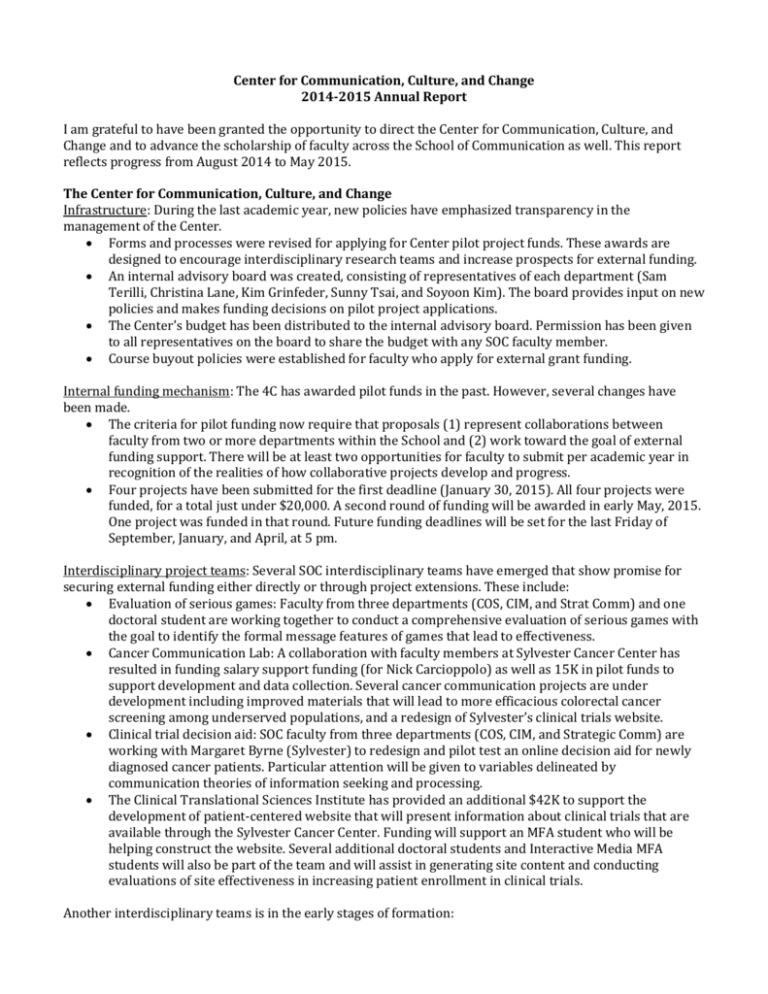
Center for Communication, Culture, and Change 2014-2015 Annual Report I am grateful to have been granted the opportunity to direct the Center for Communication, Culture, and Change and to advance the scholarship of faculty across the School of Communication as well. This report reflects progress from August 2014 to May 2015. The Center for Communication, Culture, and Change Infrastructure: During the last academic year, new policies have emphasized transparency in the management of the Center. Forms and processes were revised for applying for Center pilot project funds. These awards are designed to encourage interdisciplinary research teams and increase prospects for external funding. An internal advisory board was created, consisting of representatives of each department (Sam Terilli, Christina Lane, Kim Grinfeder, Sunny Tsai, and Soyoon Kim). The board provides input on new policies and makes funding decisions on pilot project applications. The Center’s budget has been distributed to the internal advisory board. Permission has been given to all representatives on the board to share the budget with any SOC faculty member. Course buyout policies were established for faculty who apply for external grant funding. Internal funding mechanism: The 4C has awarded pilot funds in the past. However, several changes have been made. The criteria for pilot funding now require that proposals (1) represent collaborations between faculty from two or more departments within the School and (2) work toward the goal of external funding support. There will be at least two opportunities for faculty to submit per academic year in recognition of the realities of how collaborative projects develop and progress. Four projects have been submitted for the first deadline (January 30, 2015). All four projects were funded, for a total just under $20,000. A second round of funding will be awarded in early May, 2015. One project was funded in that round. Future funding deadlines will be set for the last Friday of September, January, and April, at 5 pm. Interdisciplinary project teams: Several SOC interdisciplinary teams have emerged that show promise for securing external funding either directly or through project extensions. These include: Evaluation of serious games: Faculty from three departments (COS, CIM, and Strat Comm) and one doctoral student are working together to conduct a comprehensive evaluation of serious games with the goal to identify the formal message features of games that lead to effectiveness. Cancer Communication Lab: A collaboration with faculty members at Sylvester Cancer Center has resulted in funding salary support funding (for Nick Carcioppolo) as well as 15K in pilot funds to support development and data collection. Several cancer communication projects are under development including improved materials that will lead to more efficacious colorectal cancer screening among underserved populations, and a redesign of Sylvester’s clinical trials website. Clinical trial decision aid: SOC faculty from three departments (COS, CIM, and Strategic Comm) are working with Margaret Byrne (Sylvester) to redesign and pilot test an online decision aid for newly diagnosed cancer patients. Particular attention will be given to variables delineated by communication theories of information seeking and processing. The Clinical Translational Sciences Institute has provided an additional $42K to support the development of patient-centered website that will present information about clinical trials that are available through the Sylvester Cancer Center. Funding will support an MFA student who will be helping construct the website. Several additional doctoral students and Interactive Media MFA students will also be part of the team and will assist in generating site content and conducting evaluations of site effectiveness in increasing patient enrollment in clinical trials. Another interdisciplinary teams is in the early stages of formation: Entertainment education: Ed Talavera has agreed to direct and produce an entertainment education mini-series set in Miami which will address cancer health disparities that affect the Latino population. COS faculty, SOC doctoral students (Occa, Yang, Wendorf, plus incoming student Anderson), and Cinema MFA students will also be part of this team. Sponsored speakers, colloquia, workshops, and seminars: General Salamanca presentation and visit: This visit was the culmination of a collaboration between the Colombian National Police and UM’s Professor Lien Tran, doctoral student Jessica Wendorf, and FIU’s Dr. Maria Elena Villar to develop an intervention to address the commercial sexual exploitation of children. General Salamanca also met with UM faculty and administrators to discuss future collaborations. Flourish Klink: Ms. Klink is a transmedia producer for East Los High, an English-language entertainment education program targeting social and behavior change targeting Latinos. She provided us with an example of how faculty in social science can effectively collaborate with filmmakers, writers & producers to create social change through an entertainment education approach. FIT/Miami Do Tank (co-sponsorship): This was a conference designed to foster innovative, interdisciplinary thinking to improve disaster preparedness in Miami in which Professor Tran used a serious game to facilitate collaborative processes on this issue. Youth Forum on Climate Change and Water (co-sponsorship): This event featured Professor Sanjeev Chatterjee’s film, “One Water for Sustainable Development” as well as student-led discussions about climate change. Grant writing workshops: During the Fall 2014 semester, we hosted four grant-writing workshops for faculty and grad students that were each attended by 25-30 people. The workshops included an overview of external funding options, an introduction to locating and applying for federal funding, an introduction to foundation funding (which was conducted by UM foundation and corporate relations staff), and pointers for persuasive grant writing. Grant writing seminar: A grant writing seminar was offered during Spring semester, which paired 13 graduate students with faculty members to identify appropriate grant funding opportunities and create viable first drafts of a proposal for a federal funding source in each faculty member’s area of expertise. Visiting Knight Chair We have hired Lynn Cherney to be the Visiting Knight Chair for 2015-2016. She will be working closely with Alberto Cairo on a number of projects. In addition to teaching undergraduate classes in Journalism, she will offer a series of exciting workshops on innovative data analysis and presentation techniques. Long-term goals: Foster a culture of research, discovery, and creative activity in the School of Communication Increase the number of faculty conducting interdisciplinary research and creative activity within SOC and across UM Expand Center membership to graduate students and all UM faculty Increase internal pilot funding to support SOC faculty research o Work with faculty (and UM administrative procedures) to increase number and proportion of Provost’s Research Awards awarded to SOC faculty Increase external funding to support SOC faculty research o Workshops and training related to grant funding, research and creative methodologies, and the publication process o Facilitate opportunities for SOC faculty to serve as co-Investigators on external funding proposals Conduct a grant writing retreat for collaborating faculty who are well-positioned to create a viable external funding proposals o Visit grant funding agencies and foundations (about every 18 months), focusing strategically on those that are a good fit for faculty interests o Investigate the feasibility of developing a social science grant incubator where funded faculty help unfunded faculty develop viable grant proposals. (This would be coordinated with the Assistant Vice Provost for Research.) Increase financial support for 4C o Salary savings from members’ funded external proposals o Contract work done by 4C faculty o
